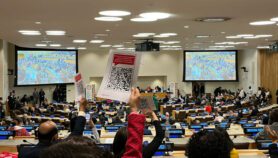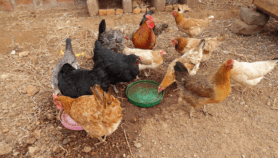Send to a friend
The details you provide on this page will not be used to send unsolicited email, and will not be sold to a 3rd party. See privacy policy.
The future of a pioneering AIDS research project that sought to boost research capacity in Ethiopia is hanging in the balance following a decision by the Dutch government to phase out funding.
The Ethio-Netherlands AIDS Research Project (ENARP) was launched jointly with the Ethiopian government in 1994. In total, the project has trained eight Ethiopian scientists to PhD level and 25 to masters level, and has provided doctors with training on antiretroviral therapy.
Dutch officials say that their main focus is now poverty reduction, and that they wish to channel their aid money into ‘development’ issues such as family planning and HIV prevention, rather than into epidemiological research. They also say that they are keen that ownership of the project should be passed to Ethiopian authorities.
But Ethiopian AIDS scientists are concerned that the future of the project — which has carried out research on HIV/AIDS in Ethiopia, created an HIV/AIDS laboratory in Addis Ababa, and trained Ethiopian scientists — is in doubt as a result of the Dutch decision.
The project’s closure would be “a devastating loss and very discouraging”, says Tsehaynesh Messele, Ethiopian programme manager of ENARP.
She adds that the project has made significant achievements in AIDS research. For example, it has documented current levels of HIV in various population groups in Addis Ababa and other areas of Ethiopia, drawing the attention of policymakers to the importance of acting on HIV/AIDS.
The Dutch government provided the project with US$13 million over the past decade through its Ministry for Development Cooperation. The Ethiopian government paid for the building and local taxes for imported equipment and materials, as well as covering electricity, water and telephone costs.
Abera Geyid, director of the Ethiopian Health, Nutrition and Research Institute, which houses the ENARP laboratory, is concerned that the project may have to close just at a time when Ethiopia is on the brink of launching a HIV vaccine initiative in collaboration with other African countries.
But the Dutch authorities insist that their decision to phase out funding over the next 18 months — rather than to terminate it immediately — is intended to allow Ethiopian authorities to step in to support the project.
“From the outset, it was meant to be a project with a high degree of ownership from the Ethiopian side,” Beate Gerlings of the Ministry’s Central and East Africa Division told SciDev.Net. “But a review of the project showed that ownership of the research was not panning out as initially intended.”
Gerlings said that the Dutch Ministry discussed its plans to phase out funding for the project with the Ethiopian government, which agreed that “there were better ways to spend Dutch Development Cooperation money to reduce poverty in Ethiopia”.
Ethiopian members of parliament are urging that other potential sources of support should be explored to continue the project, and Abera and Tsehaynesh are hopeful that other international donors will step in to support the project.













